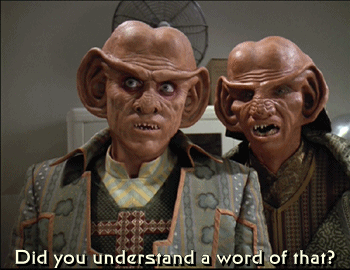Перевод по словам
— did [verb]
verb: делать, выполнять, заниматься, поступать, проделать, действовать, принимать, деть, вести себя, исполнять
— you [pronoun]
pronoun: вас, вам, вы, вами, тебя, тебе, ты, тобой
— a [article]
article: один, некий, каждый, такой же, неопределенный артикль, одинаковый, какой-то
noun: высшая отметка, круглое отлично
abbreviation: возраст, акр, пополудни
— word [noun]
noun: слово, речь, текст, известие, обещание, замечание, пароль, разговор, девиз, лозунг
verb: вести, сформулировать, выражать словами, подбирать выражения
— of [preposition]
preposition: из, о, от, об, для
— that [conjunction]
conjunction: что, чтобы
pronoun: то, тот, который, та
adverb: так, до такой степени
Предложения с «Did you understand a word of that?»
|
Did you understand a word of that? |
Ты хоть слово из этого понял? |
|
And a key theme in AI is being able to understand intelligence by creating our own computational systems that display intelligence the way we see it in nature. |
И ключевая тема в ИИ — это понимание разума путём создания вычислительных систем, которые демонстрируют разумное поведение, как мы видим его в природе. |
|
And coming back to the snorkeling trip, we actually understand a great deal about the rules that fish schools use. |
И, возвращаясь к плаванию с маской и трубкой, мы действительно многое понимаем в правилах, которыми пользуются стаи рыб. |
|
Imagine a society where we had rules of engagement where every child grew up believing that they could stand here and be a technologist of the future, or where every adult believed that they had the ability not just to understand but to change how science and technology impacts their everyday lives. |
Представьте себе общество, где были бы правила, при которых каждый ребёнок рос, веря, что он может быть на моём месте, может стать технологом будущего, или где каждый взрослый считал бы, что он обладает способностью не просто понять, но и изменить то, как наука и техника влияет на их повседневную жизнь. |
|
The second topic that challenged our ability to engage in dialogue was around my need to understand how Caitlin could vote for Trump. |
Второй темой, которая бросила вызов нашей способности вести диалог, была моя необходимость понять, как Кейтлин могла голосовать за Трампа. |
|
But most of the students just pack the knowledge without understanding the meaning of the knowledge, so that is not knowledge, that is just memorizing, and AI can do the same thing. |
Но большинство студентов просто собирают знания без понимания их смысла, так что это не знание, а простое заучивание, на которое способен и ИИ. |
|
And maybe this will help us as a society understand the kinds of trade-offs that will be implemented ultimately in regulation. |
И возможно, это даст нам, обществу, понять, какого рода компромиссы будут в итоге приняты в законодательстве. |
|
And I knew in that moment if I wanted to understand this history, if I wanted to understand the roles of those folks who had to walk, I was probably going to have to figure that out myself. |
И в этот момент я осознал, что если я хочу понять историю, если я хочу понять роли тех, кому приходилось идти пешком, мне, скорее всего, придётся разбираться в этом самому. |
|
With a greater sense of understanding comes a greater sense of wonder, and a greater realization that we are part of and not apart from the rest of nature. |
Чем больше мы понимаем, тем больше удивляемся и тем лучше осознаём, что мы часть природы, а не находимся вне её. |
|
It turns out that there is a lot that we don’t understand about climate change. |
Оказывается, есть много того, чего мы не понимаем в изменении климата. |
|
And it’s this diversity that can make the global impact of clouds very hard to understand . |
И именно это разнообразие делает глобальное влияние облаков очень сложным для понимания. |
|
But I want to share with you guys today my perspective as a geologist in how understanding earth’s past can help inform and guide decisions that we make today about how to sustainably live on earth’s surface. |
И сегодня я как геолог хочу поделиться с вами своим видением того, как понимание прошлого планеты может подсказать, как сегодня принимать решения, для поддержания жизни на планете Земля. |
|
So understanding the dynamics of these landscapes, how they formed and how they will continue to change in the future is really important for the people that live there. |
Понимание процессов формирования ландшафта и его изменений в будущем очень важно для живущих здесь людей. |
|
Today it can feel like things are happening too fast — so fast, that it can become really difficult for us to form an understanding of our place in history. |
Сегодня кажется, что всё случается слишком быстро, так быстро, что нам бывает трудно определить и осознать своё место в истории. |
|
Soil scientists at Washington State University, the grad students, anyway, are working to compost teeth with amalgam fillings so that we can understand what happens to the mercury therein. |
Учёные — грунтоведы из Университета штата Вашингтона, аспиранты, работают над компостированием зубов с пломбами, чтобы мы могли понять, что происходит со ртутью. |
|
It was like my playspace was 400 lines long and 25 columns wide — which I presume that if anybody is going to understand that, it’s this crowd. |
Она похожа на игровую площадку длиной в 400 строк и 25 столбцов в ширину — и я полагаю, что кому ещё это понять, как не собравшимся здесь. |
|
We are committed to healing ourselves, to lacing up our sneakers, to walking out of our front door every single day for total healing and transformation in our communities, because we understand that we are in the footsteps of a civil rights legacy like no other time before, and that we are facing a health crisis like never ever before. |
Мы преданны идее самоисцеления, мы зашнуровываем кроссовки и выходим из дома каждый день, чтобы исцелить и изменить наше сообщество, потому что мы понимаем, что идём по стопам наследия защиты гражданских прав как никогда раньше, и что сейчас мы стоим перед кризисом здоровья нации. |
|
So I understand that many are very pessimistic about what’s happening in the United States with President Trump. |
Тед Хэлстид: я понимаю, что многие очень пессимистично относятся к происходящему в США при президенте Трампе. |
|
But researchers have found that when people better understand the possible outcomes of an illness, they have less anxiety, greater ability to plan and less trauma for their families. |
Но исследователи обнаружили, что когда люди лучше понимают возможные исходы болезни, они меньше волнуются, могут лучше планировать, и это травмирует их семьи в меньшей степени. |
|
And when I read that if, I understood better why one in four people receives excessive or unwanted medical treatment, or watches a family member receive excessive or unwanted medical treatment. |
И когда я прочла это если, я поняла, почему один из четырёх человек получает избыточное или ненужное лечение, или член его семьи. |
|
And if we think about some of the technologies that are coming down the pike , Noriko [Arai] mentioned that reading is not yet happening in machines, at least with understanding . |
Если мы задумаемся о грядущих технологических инновациях, Норико [Араи] упомянула, что машины ещё не понимают смысл прочитанного. |
|
So it can deal with a certain amount of nastiness, and it can even understand that your nastiness, for example, you may take bribes as a passport official because you need to feed your family and send your kids to school. |
Он может справиться с плохими поступками и даже понять, что вы поступаете плохо, например, берёте взятки, работая паспортистом, потому что вам нужно кормить семью и оплачивать обучение детей. |
|
It can understand that; it doesn’t mean it’s going to steal. |
Он может это понять, и это не значит, что он будет воровать. |
|
So to understand his behavior, we actually have to invert through a model of human cognition that includes our computational limitations — a very complicated model. |
Чтобы понять его поведение, нам следует смотреть сквозь призму человеческого познания, включающего наши вычислительные ограничения и являющегося очень сложной моделью. |
|
But it’s still something that we can work on understanding . |
Но нам всё ещё есть над чем поразмыслить. |
|
Economists, sociologists, moral philosophers have understood that, and we are actively looking for collaboration. |
Экономисты, социологи, нравственные философы поняли это, и мы стараемся активно сотрудничать. |
|
It will understand , for example, that books are very biased in the evidence they contain. |
Например, он будет понимать, что книги описывают мир довольно однобоко. |
|
The two and a half alphabets which form the word प्रेम, which means love, if you are able to understand that and practice it, that itself is enough to enlighten mankind. |
Две с половиной буквы образуют слово प्रेम, что означает любовь, и если вы способны понять это и претворить в жизнь, то одного этого уже достаточно для просвещения человечества. |
|
A you that perceives time and space differently understands both your unimaginable and fantastic importance and your complete unimportance in the larger context of the universe. |
Это вы, кто воспринимает время и пространство по — разному, но осознаёт одновременно свою невероятную и удивительную важность и в то же время ничтожность в более широком контексте Вселенной. |
|
They might impact the environment in ways that we think we understand , but also in ways that we don’t. |
Их воздействие на среду обитания нам кажется предсказуемым, но они могут отразиться и неизвестным нам образом. |
|
But at the same time, as important as knowing where we’re from, is understanding that deep down, we’re all from nowhere and a little bit from everywhere. |
Но в то же время так же важно понимать, что все мы в глубине души пришли ниоткуда и одновременно отовсюду. |
|
The challenge is to understand the biology of the context of our behaviors, and that’s real tough. |
Сложность кроется в понимании биологии контекста нашего поведения, что невероятно трудно. |
|
But to understand that, we have to step back a little bit. |
Чтобы понять это, нужно сделать небольшой шаг назад. |
|
Basically, what we’re seeing here is, if you want to understand a behavior, whether it’s an appalling one, a wondrous one, or confusedly in between, if you want to understand that, you’ve got take into account what happened a second before to a million years before, everything in between. |
Самое главное: чтобы понять поведение, независимо от того, ужасное оно, образцовое или представляет собой что — то среднее, нужно учитывать всё, что произошло за последние миллион лет, а не только за одну секунду до. |
|
Why did it take months before Americans understood that they were under a state-sponsored information attack? |
Почему потребовались целые месяцы, прежде чем американцы поняли, что находятся под информационной атакой, спонсируемой государством? |
|
Before the first iPhone even hit the shelf, the Russian government understood the risks and the opportunity that technology provided and the inter-communication and instant communication it provided us. |
Ещё до того, как первый iPhone появился на полках магазинов, российское правительство осознало опасность и возможности технологий, а также мгновенную коммуникацию, которую они могли обеспечить. |
|
Second of all, we must understand that truth is not relative. |
Во — вторых, нужно понимать, что истина не относительна. |
|
Influential Nigerians were telling us at the time that we were naïve, we didn’t understand the political situation in Nigeria. |
В то время влиятельные нигерийцы говорили нам, что мы наивны и не понимаем политическую ситуации в Нигерии. |
|
On that terrible night, after learning that Joel had perhaps four months to live, I cuddled up with my two older sons in bed — they were five and three at the time — and I never really knew how much they understood , so I started telling them a bedtime story. |
В ту ужасную ночь после осознания, что у Джоэла осталось, возможно, 4 месяца жизни, я прижалась к моим двум старшим сыновьям — им было в то время три и пять лет — и я не могла знать на самом деле, как они понимают ситуацию, поэтому я начала рассказывать им историю на ночь. |
|
I was just building up a context that they could understand and hoping that our prayers would be answered and I would never have to tell them that that knight, who had fought so bravely, was done fighting and could rest now, forever. |
Я лишь расширяла содержание, которое они могли бы понять, и надеялась, что наши молитвы будут услышаны, и мне никогда не придётся рассказывать им, что рыцарь, который сражался так храбро, прекратил сражение и теперь может отдыхать, бесконечно. |
|
I’ve spent a long time calibrating it, running millions of CPU hours on supercomputers and really trying to understand that data. |
Я трачу много времени на их калибровку, проводя миллионы часов за суперкомпьютером, пытаясь эти данные расшифровать. |
|
What my job has taught me over the years is that to really understand data and their true potential, sometimes we actually have to forget about them and see through them instead. |
Моя работа за эти годы научила меня, что чтобы действительно понимать данные и их истинный потенциал, иногда нам надо забыть о них, и посмотреть сквозь них. |
|
I don’t know if I do it right, but the most important thing is that I know it and I understand it. |
Не знаю, насколько успешно, но главное, что я знакóм с этим приложением, разбираюсь в нём. |
|
Our purpose in this dialogue today is to try to do something about that, to try to have a different kind of conversation, to do some listening, some thinking, some understanding . |
Давайте попытаемся сегодня сдвинуть ситуацию с мёртвой точки, попробуем наладить диалог, где участники слышат друг друга, относятся с пониманием. |
|
He understood what I think the two major parties did not, which was that’s not the debate anymore. |
Он понял то, что обе основные партии упустили, а именно, что спор был уже не об этом. |
|
I mean, have you seen that in your conversations with people, in your understanding of their mindset? |
Замечали вы подобное в общении с людьми, пытаясь выяснить ход их мыслей? |
|
And maybe that’s why I have an understanding of what happened here, because those people often feel like nobody’s listening to them, and that we’re only concentrating on California and New York. |
Может, поэтому мне предельно ясно, что тут происходит, потому что эти люди часто чувствуют себя ненужными, забытыми, в отличие от Калифорнии и Нью — Йорка. |
|
I’ve tried to convince progressive friends that they need to understand what motivates Trump supporters. |
Я пытался убедить прогрессивных товарищей, что им нужно понять мотивацию сторонников Трампа. |
|
And so, understanding that doesn’t take fighting, it takes conversation and then asking, What are we going to replace Trump with? |
Для осонания этого не нужно никакой борьбы, просто поговорить и задаться вопросом: Чем мы собираемся заменить Трампа? |
|
See, I understand how that happened. |
Кажется, я понимаю, как это произошло. |
|
But I think that everything starts from the top, and the power that he has in encouraging his supporters to have an understanding of where people are coming from on the other side. |
Но я думаю, что все изменения начинаются сверху, и власть, которой он обладает, — побудить своих сторонников понять, каковы мотивы оппонентов, что движет людьми по ту сторону. |
|
I didn’t really understand it, except for the fact that it was destroying my parents. |
Я не понимала, что происходит, но видела, что это разрушает жизнь моих родителей. |
|
And from humans and other mammal species, we’re starting to understand that the biological recipe of milk can be different when produced for sons or daughters. |
Изучая человека и других млекопитающих, мы выяснили, что биологический состав молока зависит от того, кто родится: сын или дочь. |
|
These mothers deserve knowledgeable clinical staff that understand these processes. |
Эти мамы заслуживают квалифицированный медицинский персонал, который понимает эти процессы. |
|
It’s also about understanding what is important in breast milk so that we can deliver better formulas to moms who cannot or do not breastfeed for whatever reason. |
Речь идёт о понимании того, что важно в грудном молоке, чтобы можно было создавать улучшенную смесь для тех мам, которые не могут кормить самостоятельно по разным причинам. |
|
I don’t need to tell anyone here that there are a lot of dividing lines in our society right now, and a lot of them start to make sense, once you understand people’s relationships with these government numbers. |
Нет нужды объяснять вам, что сегодня в нашем обществе много разграничительных линий, и многие из них приобретают смысл, когда вы понимаете отношение людей к этим данным правительства. |
|
We, all of us, have to understand that thinking inwards is not the solution to the world’s problems. |
Мы — каждый из нас — должны понимать: чтобы решать глобальные проблемы, нужно и думать глобально. |
|
I’m asking them to wake up and understand that we need a new form of governance, which is possible and which harmonizes those two needs, those good for our own people and those good for everybody else. |
Я прошу их очнуться и понять, что нам нужны новый стиль управления, — и это осуществимо, — который сможет отвечать и тем, и другим нуждам, и новые решения, которые будут выгодны для всех. |
|
When the war was over, I got permission — unbelievably — from my medical school to take some time off and follow some of the families that I had befriended in the camp back to their village in Kosovo, and understand how they navigated life in this postwar setting. |
После окончания войны я получила разрешение на отпуск, что само по себе уже невероятно, чтобы сопровождать несколько семей, с которыми я подружилась в лагере, обратно в Косово и понаблюдать, как они будут налаживать свою жизнь после войны. |
|
And it actually turns out that this feature of life is incredibly difficult to explain and be understood by people who are living outside of it. |
И получается, что эту особенность очень трудно объяснить тем людям, которые с ней ни разу не сталкивались. |

Did You Understand A Word Of That animation gif
More DS9 Gifs
House Md Funny Face
Deep Space Nine Star Trek
Star Trek DS9
Girls Romance In Deep Space 9
Did You Understand A Word Of That
Deep Space War Star Ships
Star Trek Space Battle
Star Trek Attack Wing
Star Trek Battle Closeup
Deep Space 9 Battle Of Sector 001
Star Fleet Ship Flying
Star Trek Ship Deep Space
Deep Space 9 Star Trek
Deep Space Nine Station
Star Trek Deep Space Nine
Star Trek Deep Space Nine
Best Deep Space Nine
Amazing Deep Space 9
Deep Space Star Trek
Major Kira Deep Space Nine
Star Trek Next Generation Geordi
Odo Deep Space 9
Deep Space 9 Star Trek
Funny Commander
Deep Space Nine
Star Trek Deep Space
To download the gifs.
On desktop right click the animation and select save.
On mobile and touchscreens, press down on the gif for a couple of seconds and the save option will appear.
To Share out the gifs click on the gif and use the share tools.
Thank you for visiting. We make a lot of gifs here, especially all the Holidays and Birthday card gifs. We like to hand select the best gifs found on the internets.The tiny gifs can be as old as 1999.
Best Animations is a collection of animated gifs found on the web and original exclusive gifs made by us.
Gifs can be shared on personal non commercial pages along with a link to BestAnimations.com .
Images created by Best Animations can not be edited, can not have the copyright mark removed, can only be used for sharing along with a link pointing to http://bestanimations.com.
If artist name appears next to the animation or on the animation then you
must check the copyright restrictions with the original author.
Please notify the
webmaster if you are the owner of copyrighted animation that is not credited and would like to receive credit and a link.
Присоединяйтесь к Reverso, это удобно и бесплатно!
английский
арабский
немецкий
английский
испанский
французский
иврит
итальянский
японский
корейский
голландский
польский
португальский
румынский
русский
шведский
турецкий
украинский
китайский
Показать больше
(греческий, хинди, тайский, чешский…)
чешский
датский
греческий
фарси
хинди
венгерский
словацкий
тайский
Показать меньше
русский
Синонимы
арабский
немецкий
английский
испанский
французский
иврит
итальянский
японский
корейский
голландский
польский
португальский
румынский
русский
шведский
турецкий
украинский
китайский
Показать больше
чешский
датский
греческий
фарси
хинди
венгерский
словацкий
тайский
Показать меньше
На основании Вашего запроса эти примеры могут содержать грубую лексику.
На основании Вашего запроса эти примеры могут содержать разговорную лексику.
Didn’t understand a word of that.
I didn’t understand a word of that.
I took Spanish and I didn’t understand a word of that.
So you didn’t understand a word of that either?
Результатов: 873091. Точных совпадений: 6. Затраченное время: 279 мс
Documents
Корпоративные решения
Спряжение
Синонимы
Корректор
Справка и о нас
Индекс слова: 1-300, 301-600, 601-900
Индекс выражения: 1-400, 401-800, 801-1200
Индекс фразы: 1-400, 401-800, 801-1200
© 2013-2022 Reverso Technologies Inc. Все права защищены.
Похожие слова: not understand a word
Синонимы & Антонимы: не найдено
Примеры предложений: not understand a word |
|
|---|---|
| If you don’t understand the meaning of a word, look it up in the dictionary. |
Если вы не понимаете значение слова, найдите его в словаре. |
| One word to those who understand it is worth more than a whole speech to those who do not understand it. |
Одно слово для тех, кто понимает это, стоит больше, чем целая речь для тех, кто этого не понимает. |
| I need more examples to understand how the word is used. |
Мне нужно больше примеров, чтобы понять, как используется это слово. |
| I can’t understand this word. Do you have a dictionary? |
Я не могу понять это слово. У тебя есть словарь? |
| I am so clever that sometimes I don’t understand a single word of what I am saying. |
Я настолько умен, что иногда я не понимаю ни слова из того, что говорю. |
| Since their conversation was in French, I couldn’t understand a word. |
Поскольку их разговор был на французском, я не мог понять ни слова. |
| He started speaking in Berber and I couldn’t understand half a word of what he was telling me. |
Он начал говорить по-берберски, и я не мог понять ни слова из того, что он мне говорил. |
| Someone said, «I met two very beautiful women who were whispering. I did not understand a word.» |
Кто-то сказал: «Я встретил двух очень красивых женщин, которые шептались. Я не понял ни слова». |
| Tom and Mary were speaking in French, so I didn’t understand a word they were saying. |
Том и Мэри говорили по-французски, поэтому я не поняла ни слова, которое они говорили. |
| Tom couldn’t understand a single word of what Mary said. |
Том не мог понять ни слова из того, что сказала Мэри. |
| Did you understand a word of that? |
Вы поняли хоть слово из этого? |
| I don’t understand a word of it. |
Я не понимаю ни слова. |
| It was a word Mr Stoker would readily understand and disapprove of, sir. |
Это слово мистер Стокер с готовностью понял и не одобрил бы, сэр. |
| Go tomorrow to Santiago, and ask your friend Francisco to dispense you of that word, and to understand that you’re not a man yet. |
Поезжай завтра в Сантьяго и попроси своего друга Франсиско избавить тебя от этого слова и понять, что ты еще не мужчина. |
| ‘I am sure he was a very nice young man, but I could not make him understand a word I said. |
— Я уверена, что он был очень приятным молодым человеком, но я не могла заставить его понять ни слова из того, что сказала. |
| I usually make friends with the ladies who do my nails, but I can’t understand a word those Cuban gals are saying. |
Обычно я дружу с дамами, которые делают мне маникюр, но я не понимаю ни слова из того, что говорят эти кубинские девушки. |
| I put up with the libel though. I could with one word… do you understand what she is?» |
Но я смирился с клеветой. Я мог бы одним словом … вы понимаете, что она? » |
| And, as I understand it, he’s already sent word to the good senator that he is disinclined to testify before the committee and answer to what, as of now, are false charges. |
И, как я понимаю, он уже дал понять доброму сенатору, что не желает давать показания перед комитетом и отвечать на то, что на данный момент является ложными обвинениями. |
| Everyone started talking in Berber and I didn’t understand a word. |
Все заговорили по-берберски, а я не поняла ни слова. |
| I couldn’t understand a single word of what they said. |
Я не мог понять ни единого слова из того, что они сказали. |
| The word bar is more common in British English, and the word measure is more common in American English, although musicians generally understand both usages. |
Слово bar чаще встречается в британском английском, а слово measure-в американском английском, хотя музыканты обычно понимают оба употребления. |
| The word genocide was generated from a need for new terminology in order to understand the gravity of the crimes committed by the Nazis. |
Слово геноцид возникло из-за необходимости новой терминологии, чтобы понять тяжесть преступлений, совершенных нацистами. |
| The formula was inspired by Rudolf Flesch’s Flesch–Kincaid readability test which used word — length to determine how difficult a word was for readers to understand . |
Формула была вдохновлена тестом на читаемость Рудольфа Флеша–Кинкейда, который использовал длину слова, чтобы определить, насколько трудно слово было для читателей понять. |
| A child learns the syntax of their language when they are able to join words together into sentences and understand multiple — word sentences said by other people. |
Ребенок изучает синтаксис своего языка, когда он может объединять слова в предложения и понимать предложения из нескольких слов, сказанные другими людьми. |
| Standard Greek lexicons and dictionaries understand this word as a reference to homosexual behavior. |
В стандартных греческих лексиконах и словарях это слово понимается как указание на гомосексуальное поведение. |
1
word
(a) mot
m
; mot
m
, parole
f
;
∎ ironic (what) fine words! quelles belles paroles!;
∎ what is the Russian word for «head»?, what is the word for «head» in Russian? comment dit-on «head» en russe?;
∎ she can’t put her ideas/her feelings into words elle ne trouve pas les mots pour exprimer ses idées/ce qu’elle ressent;
∎ I can’t find (the) words to tell you how glad I am! je ne saurais vous dire à quel point je suis content!;
∎ there are no words to describe or words cannot describe how I feel aucun mot ne peut décrire ce que je ressens;
∎ lazy isn’t the word for it! paresseux, c’est peu dire!;
∎ figurative he doesn’t know the meaning of the word «generosity» il ne sait pas ce que veut dire le mot «générosité»;
∎ he’s mad, there’s no other word for it il est fou, il n’y a pas d’autre mot;
∎ there’s a word for people like you, it’s «thief» les gens dans ton genre, on les appelle des voleurs;
∎ I don’t believe a word of it! je n’en crois pas un mot!;
∎ that’s my last or my final word on the matter c’est mon dernier mot (sur la question);
∎ can I give you a word of warning/of advice? puis-je vous mettre en garde/vous conseiller?;
∎ he’s a man of few words c’est un homme peu loquace, c’est quelqu’un qui n’aime pas beaucoup parler;
∎ in the words of his boss, he’s a layabout à en croire son patron ou d’après (ce que dit) son patron, c’est un fainéant;
∎ by or through word of mouth oralement;
∎ (upon) my word! ma parole!, oh la la!;
∎ not a word! pas un mot!, bouche cousue!;
∎ words fail me! j’en perds la parole!, je suis stupéfait!;
∎ British it’s the last word in comfort c’est ce qui se fait de mieux en matière de confort;
∎ British it’s the last word in luxury c’est ce qu’on fait de plus luxueux
(b) mot(s)
m(pl)
, parole(s)
f(pl)
;
∎ can I have a word with you about the meeting? est-ce que je peux vous dire deux mots à propos de la réunion?;
∎ can I have a word? je voudrais vous parler un instant
(c)
(UNCOUNT)
nouvelle(s)
f(pl)
; message
m
, mot
m
;
∎ have you had any word from him? avez-vous eu de ses nouvelles?;
(d) parole
f
, promesse
f
;
∎ we held or we kept her to her word nous l’avons obligée à tenir sa parole;
∎ word of honour! parole d’honneur!;
∎ take my word (for it), it’s a bargain! croyez-moi, c’est une affaire!;
∎ a word to travellers, watch your luggage! un petit conseil aux voyageurs, surveillez vos bagages!;
∎ just give or say the word and we’ll be off vous n’avez qu’à donner le signal et nous partons
(h) mot
m
d’ordre; mot
m
de passe;
∎ the word now is «democracy» le mot d’ordre maintenant, c’est «démocratie»
(a) rédiger, formuler; rédiger;
American familiar
∎ word (up)! parfaitement!□ ; sans dec!
en un mot
autrement dit, en d’autres termes
word picture description
f
imagée ou pittoresque; portrait
m
en prose;
Computing word wrap retour
m
à la ligne automatique
Un panorama unique de l’anglais et du français > word
2
to
1. tə,tu
1) a, hacia
2) a, hasta
3) hasta
4) con, a
5) a, para
6) en
7) a

9) para
10) (hacerlo)
2. tu:
1) hasta cerrar
2) a
•
a
a / hasta
menos
para
to
■ did you go to the bank? ¿fuiste al banco?
■ A is to the north/south/east/west of B A está al norte/sur/este/oeste de B
3 (as far as, until) a, hasta
■ I like all music, from Abba to ZZTop me gusta toda la música, desde Abba hasta ZZTop
■ what’s the answer to question 4? ¿cuál es la respuesta a la pregunta número 4?
7 (attitude, behaviour) con, para con
■ to my surprise, it was empty para mi sorpresa, estaba vacío
■ to a foreigner, it must seem awful para un extranjero, debe parecer terrible
■ to some people he was a hero, to others a traitor para algunos era un héroe, para otros era un traidor
15 (per, equivalent) a, en
■ how much does your car do to the gallon? ≈ ¿cuánto gasta tu coche a los cien kilómetros?
■ is it to your taste? ¿es de su agrado?
■ would you like to dance? —I’d love to ¿te gustaría bailar? —me encantaría
■ she didn’t want to go, but she had to no quería ir, pero no le quedaba más remedio
SMALLIDIOMATIC EXPRESSION/SMALL
to and fro vaivén, ir y venir Table 1SMALLNOTA/SMALL Cuando se usa con la raíz del verbo para formar el infinitivo no se traduce/Table 1 ■ I want to help you quiero ayudarte
a un estado consciente
to and fro de aquí para allá, de un lado para otro
a, hacia
en, sobre
hasta, a
a, hasta
I tuː, weak form tə
preposition
1)
we went to John’s — fuimos a casa de John, fuimos a lo de John (RPl), fuimos donde John (esp AmL)
you can wear it to a party/the wedding — puedes ponértelo para una fiesta/la boda
to the left/right of something — a la izquierda/derecha de algo
2) (against, onto)
3)
4)
who did you send/give it to? — ¿a quién se lo mandaste/diste?
what did you say to him/them? — ¿qué le/les dijiste?
I was singing/talking to myself — estaba cantando/hablando solo
to me, he will always be a hero — para mí, siempre será un héroe
he was very kind/rude to me — fue muy amable/grosero conmigo
b) (in toasts, dedications)
5) (indicating proportion, relation)
there’s a 10 to 1 chance of… — hay una probabilidad de uno en 10 de…
7)
to my horror/delight… — para mi horror/alegría…
it has a nice ring/sound to it — suena bien
ten to three — las tres menos diez, diez para las tres (AmL exc RPl)
they sang it to the tune of `Clementine’ — lo cantaron con la melodía de `Clementine’
II tə
1)
a)
to sing/fear/leave — cantar/temer/partir
it’s easy/difficult to do — es fácil/difícil de hacer
III tuː
[tʊ, tuː, tǝ]
When to is the second element in a phrasal verb, eg set to, heave to, look up the phrasal verb. When to is part of a set combination, eg nice to, to my mind, to all appearances, appeal to, look up the other word.
Note: a + el = al
to go to Paris/Spain — ir a París/España
to go to school/university — ir al colegio/a la Universidad
I liked the exhibition, I went to it twice — me gustó la exposición, fui a verla dos veces
we’re going to John’s/my parents’ for Christmas — vamos a casa de John/mis padres por Navidad
• have you ever been to India? — ¿has estado alguna vez en la India?
• flights to Heathrow — vuelos a or con destino a Heathrow
• the road to Edinburgh — la carretera de Edimburgo
church 1., 2)
2) hacia
move it to the left/right — muévelo hacia la izquierda/derecha
3) hasta
4) hasta
• to this day I still don’t know what he meant — aún hoy no sé lo que quiso decir
• from Monday to Friday — de lunes a viernes
• funds to the value of… — fondos por valor de…
decimal 1.
5) a
6) contra
it’s a quarter to three — son las tres menos cuarto, es or (LAm) falta un cuarto para las tres
«that’s strange,» I said to myself — -es raro -me dije para mis adentros
9)
«to P.R. Lilly» — «para P.R. Lilly»
10) por
three to the fourth, three to the power of four — (Math) tres a la cuarta potencia
12)
«to repairing pipes:…» — «reparación de las cañerías:…»
13) según
14)
it is sung to the tune of «Tipperary» — se canta con la melodía de «Tipperary»
15) de
16)
• to look forward to doing sth — tener muchas ganas de hacer algo
• to prefer painting to drawing — preferir pintar a dibujar
• to be used to (doing) sth — estar acostumbrado a (hacer) algo
• to this end — a or con este fin
• to my enormous shame I did nothing — para gran vergüenza mía, no hice nada
• to my great surprise — con gran sorpresa por mi parte, para gran sorpresa mía
a)
A preposition may be required with the Spanish infinitive, depending on what precedes it: look up the verb.
• she refused to listen — se negó a escuchar
• to start to cry — empezar or ponerse a llorar
• to try to do sth — tratar de hacer algo, intentar hacer algo
• to want to do sth — querer hacer algo
• I’d advise you to think this over — te aconsejaría que te pensaras bien esto
• he’d like me to give up work — le gustaría que dejase de trabajar
• we’d prefer him to go to university — preferiríamos que fuese a la universidad
• I want you to do it — quiero que lo hagas
c)
there was no one for me to ask, there wasn’t anyone for me to ask — no había nadie a quien yo pudiese preguntar
• that book is still to be written — ese libro está todavía por escribir
• now is the time to do it — ahora es el momento de hacerlo
• and who is he to criticize? — ¿y quién es él para criticar?
3) para
it disappeared, never to be seen again — desapareció para siempre
The particle to is not translated when it stands for the infinitive:
«would you like to come to dinner?» — «I’d love to!» — -¿te gustaría venir a cenar? -¡me encantaría!
For combinations like difficult/easy/foolish/ ready/ slow to etc, look up the adjective.
the first/last to go — el primero/último en irse
See:
EASY, DIFFICULT, IMPOSSIBLE in easy
7)
to see him now one would never think that… — al verlo or viéndolo ahora nadie creería que…
3.
ADVERB
to pull the door to — tirar de la puerta para cerrarla, cerrar la puerta tirando
to push the door to — empujar la puerta para cerrarla, cerrar la puerta empujando
* * *
I [tuː], weak form [tə]
preposition
1)
we went to John’s — fuimos a casa de John, fuimos a lo de John (RPl), fuimos donde John (esp AmL)
you can wear it to a party/the wedding — puedes ponértelo para una fiesta/la boda
to the left/right of something — a la izquierda/derecha de algo
2) (against, onto)
3)
4)
who did you send/give it to? — ¿a quién se lo mandaste/diste?
what did you say to him/them? — ¿qué le/les dijiste?
I was singing/talking to myself — estaba cantando/hablando solo
to me, he will always be a hero — para mí, siempre será un héroe
he was very kind/rude to me — fue muy amable/grosero conmigo
b) (in toasts, dedications)
5) (indicating proportion, relation)
there’s a 10 to 1 chance of… — hay una probabilidad de uno en 10 de…
7)
to my horror/delight… — para mi horror/alegría…
it has a nice ring/sound to it — suena bien
ten to three — las tres menos diez, diez para las tres (AmL exc RPl)
they sang it to the tune of `Clementine’ — lo cantaron con la melodía de `Clementine’
II [tə]
1)
a)
to sing/fear/leave — cantar/temer/partir
it’s easy/difficult to do — es fácil/difícil de hacer
III [tuː]
English-spanish dictionary > to
3
give
1.
,
1) geben; überbringen; übergeben (to an +
Akk.
)
give me… — geben Sie mir…; verbinden Sie mich mit…
2) schenken; spenden; geben; vermachen
give somebody something, give something to somebody — jemandem etwas schenken
the book was given [to] me by my son — das Buch hat mir mein Sohn geschenkt
I wouldn’t have it if it was given [to] me — ich würde es nicht mal geschenkt nehmen; abs.
give [a donation] to charity — für wohltätige Zwecke spenden
give and take — Kompromisse eingehen; geben und nehmen
3) verkaufen; geben; zahlen; geben ; geben; opfern
give somebody something [in exchange] for something — jemandem etwas für etwas [im Tausch] geben
I would give anything or my right arm/a lot to be there — ich würde alles/viel darum geben, wenn ich dort sein könnte
4) aufgeben [Hausaufgaben, Strafarbeit usw.]; geben [10 Jahre Gefängnis usw.]
5) geben [Erlaubnis, Arbeitsplatz, Interview, Rabatt, Fähigkeit, Kraft]; verleihen [Preis, Titel, Orden usw.]
he was given the privilege/honour of doing it — ihm wurde das Vorrecht/die Ehre zuteil, es zu tun
7) geben [Recht, Zeit, Arbeit]; überlassen [seinen Sitzplatz]; lassen [Wahl, Zeit]
they gave me [the use of] their car for the weekend — sie überließen mir ihr Auto übers Wochenende
give me London any day or time or every time — London ist mir zehnmal lieber
I[‘ll] give you/him etc. that — : das gebe ich zu; zugegeben
it cost £5, give or take a few pence — es hat so um die fünf Pfund gekostet
given time, I’ll do it — wenn ich Zeit habe, mache ich es

9) geben; verleihen [Charme, Reiz, Gewicht, Nachdruck]; bereiten, machen [Freude, Mühe, Kummer]; bereiten, verursachen [Schmerz]; bieten [Abwechslung, Schutz]; leisten [Hilfe]; gewähren [Unterstützung]
10) angeben [Namen, Anschrift, Alter, Grund, Zahl]; nennen [Grund, Einzelheiten, Losungswort]; geben [Rat, Beispiel, Befehl, Anweisung, Antwort]; fällen [Urteil, Entscheidung]; sagen [Meinung]; bekannt geben [Nachricht, Ergebnis]; machen [Andeutung]; erteilen [Verweis, Rüge]; [Wörterbuch, Brief:] enthalten; [Zeitung:] bringen [Bericht]
12) geben [Vorstellung, Konzert]; halten [Vortrag, Seminar]; vorlesen [Gedicht, Erzählung]; singen [Lied]; spielen [Schauspiel, Oper, Musikstück]
ladies and gentlemen, I give you the Queen — meine Damen, meine Herren, auf die Königin od. das Wohl der Königin
14) geben [Licht, Milch]; tragen [Früchte]; ergeben [Zahlen, Resultat]; erbringen [Ernte]
16) geben; versetzen [Schlag, Stoß]; verabreichen , geben [Arznei]
give somebody a [friendly] look — jemandem einen [freundlichen] Blick zuwerfen
17) geben [Zeichen, Stoß, Tritt]; machen [Satz, Ruck]; ausstoßen [Schrei, Seufzer, Pfiff]
give a [little] smile — [schwach] lächeln
give something/somebody a look — sich (Dat.) etwas/jemanden ansehen
be given to something/doing something — zu etwas neigen/etwas gern tun
19) geben [Party, Empfang, Essen usw.]
20)
give somebody/something two months/a year — jemandem/einer Sache zwei Monate/ein Jahr geben
2.
,
gave, given
1) nachgeben ; [Knie:] weich werden; [Bett:] federn; zusammenbrechen; [Brücke:] einstürzen; nachlassen
give on to the street/garden — [Tür usw.:] auf die Straße hinausführen/in den Garten führen
3.
noun
1) Nachgiebigkeit, die; Elastizität, die
have [no] give — [nicht] nachgeben
2)
Phrasal Verbs:
— academic.ru/31217/give_away»>give away
— give back
— give in
— give off
— give out
— give over
— give up
— give way
* * *
rausgeschmissen werden
* * *
[gɪv]
<gave, given>
1. (in collocations) see birth 1, blood I. 1, call I. 1, chase I. 1, evidence I. 2, kiss2 I. 1, look I. 1, smile I.
▪ to give sb sth [or sth to sb] jdm etw geben
to give sb a cold jdn mit seiner Erkältung anstecken
to give a woman in marriage to sb eine Frau an jdn verheiraten
▪ to give sb sth medicine jdm etw geben
to give sb a sedative jdm ein Beruhigungsmittel geben
▪ to give sb sth [or sth to sb] jdm etw schenken; (donate) jdm etw spenden
please give generously wir bitten um großzügige Spenden
to give sb a present jdm etwas schenken
to give sb sth as a present jdm etw schenken
▪ to give sb sth jdm etw geben
to give sb an excuse for sth/for doing [or to do] sth jdm als Entschuldigung für etw akk dienen
to give sb food jdm zu essen geben
to give sb one’s seat jdm seinen Platz anbieten
to give sb something to eat/drink jdm etwas zu essen/trinken anbieten
given the choice wenn ich die Wahl hätte; see also example 1, strength 12, support II. 2, 4
to give one’s baby/sth into sb’s care jdm sein Baby/etw anvertrauen
to give sb the power to do sth jdn dazu bevollmächtigen, etw zu tun
I’d give anything [or the world] [or my right arm] to be… ich würde alles dafür geben [o tun],… zu sein
8. (sell, pay)
to give sb sth for £20 jdm etw für 20 Pfund verkaufen
to give sb £20 for sth jdm für etw akk 20 Pfund zahlen
how much did you give for that? wie viel hast du dafür gezahlt?
I’ll give you the camera for £100 für 100 Pfund gehört die Kamera dir!
▪ to give sb sth etw bei jdm hervorrufen
sth gives sb a headache jd bekommt von etw dat Kopfschmerzen; ( fig) etw bereitet jdm Kopfschmerzen
to give sb/sth a bad name jdn/etw in Verruf bringen
to give sb to understand that… jdm zu verstehen geben, dass…
the fresh air has given us an appetite die frische Luft hat uns Appetit gemacht
that will give you something to think about! darüber kannst du ja mal nachdenken!
what gave you that idea? wie kommst du denn auf die Idee?; see also joy 1, pleasure 1, pain I. 1, 2, trouble I. 4
▪ to give sb sth jdm etw geben
to give sb his/her due jdm Ehre erweisen
give the devil his due Ehre, wem Ehre gebührt
to give sb encouragement jdn ermutigen
to give sb permission [to do sth] jdm die Erlaubnis erteilen[, etw zu tun]
to give one’s age/name sein Alter/seinen Namen angeben
to give a decision court ein Urteil fällen
to give sb the news of sth jdm etw mitteilen
can you give me any details? können Sie mir irgendwelche Einzelheiten nennen?
she wouldn’t give me her opinion sie wollte mir nicht sagen, was sie denkt
he couldn’t give me a reason why… er konnte mir auch nicht sagen, warum…
give him my thanks richten Sie ihm meinen Dank aus
give her my regards [or my best wishes] grüß’ sie schön von mir!; see also advice 1, answer I. 1, information I. 1, notice II. 4, warning 2
to be given full sentence/life imprisonment die Höchststrafe/lebenslang bekommen
give me the police/sales department/Mr Smith verbinden Sie mich bitte mit der Polizei/der Verkaufsabteilung/Mr. Smith
▪ to give sb sth time jdm etw geben
just give me two more days geben Sie mir noch zwei Tage extra
I’ll give you a day to think it over ich lasse dir einen Tag Bedenkzeit
give yourself time to get over it lass’ dir Zeit, um darüber hinwegzukommen
give or take mehr oder weniger
he came at six o’clock, give or take a few minutes er kam so gegen sechs
to give sb/sth three months/five years marriage, relationship jdm/etw drei Monate/fünf Jahre geben
to give a concert ein Konzert geben
to give a speech/lecture eine Rede/einen Vortrag halten
give us a song, John sing uns was vor John!
to give a party/reception eine Party/einen Empfang geben
to give a bark bellen
to give a cry/groan aufschreien/-stöhnen
to give a noise ein Geräusch von sich dat geben; see also laugh I. 1, sigh I.
give me PONS every time [or any day] es geht doch nichts über PONS!
to give one’s life to sth etw dat sein Leben widmen
I’ll give you what for, young lady, coming home at 2 o’clock in the morning! ich geb’ dir gleich was, junge Dame — um zwei Uhr morgens nach Hause zu kommen!
▪ to give sth result, number etw ergeben
to give milk/light Milch/Licht geben
to give warmth Wärme spenden
to give sb’s hand a squeeze jdm die Hand drücken
to give sb a [dirty/friendly] look jdm einen vernichtenden/freundlichen Blick zuwerfen
to give a shrug mit den Schultern [o Achseln] zucken
25. (admit/grant)
she’s quite brave, I’ll give you that das gestehe ich dir zu — Mut hat sie
I’ll give you that das muss man dir lassen
▪ to be given to sth zu etw dat neigen
to give a toast to sb auf jdn einen Tost ausbringen
I give you the president auf den Präsidenten!; (as speaker) das Wort hat der Präsident
28.
▶ give me a break! jetzt mach aber mal halblang! fam; (stop) jetzt hör’ aber auf! fam; (don’t believe) das glaubst du doch selbst nicht! fam
▶ I don’t give a damn ( fam) [or (fam!) a shit] [or ( vulg) a fuck] das ist mir scheißegal! derb
▶ to give a dog a bad name BRIT ( saying) alte Geschichten [wieder] aufwärmen
▶ don’t give me that! komm mir doch nicht damit! fam
▶ you just have to give it a go du musst es einfach versuchen! fam
<gave, -n>
▪ to give to sth charity für etw akk spenden
to give of one’s best sein Bestes geben
to give of one’s money/time sein Geld/seine Zeit opfern
to give generously großzügig spenden
to give and take [gegenseitige] Kompromisse machen
2. (bend, yield) rope reißen; bed federn; knees weich werden
▪ to give [under [or with] sth] weight [unter etw dat] nachgeben
you can’t work so hard all the time, something’s bound to give du kannst nicht die ganze Zeit so hart arbeiten, sonst wird das irgendwann mal ganz böse ausgehen! sl
▪ sth gives patience mit etw dat ist es vorbei; nerves, voice etw versagt
what gives? was gibt’s Neues?
what gives here? was ist hier so los? fam
give! erzähl’ schon! fam
7.
▶ to give as good as one gets Gleiches mit Gleichem vergelten
to [not] have much give [nicht] sehr nachgeben; (elastic) [nicht] sehr elastisch sein
* * *
[gɪv]
vb
:
pret
gave,
ptp
given
I’d give a lot/the world/anything to know… —
11 o’clock, give or take a few minutes — so gegen 11 Uhr
six foot, give or take a few inches — ungefähr sechs Fuß
2) schenken; spenden, geben
it was given to me by my uncle, I was given it by my uncle — ich habe es von meinem Onkel bekommen or geschenkt bekommen
3) machen; schenken; gewähren
to give sb support —
give me strength/patience! — großer Gott!
to give sb a look/smile — jdn ansehen/anlächeln
to give sb a push/kick — jdm einen Stoß/Tritt geben, jdn stoßen/treten
to give one’s hair a brush/wash — sich die Haare bürsten/waschen
give me Shakespeare/Spain (every time)! —
give me Renoir and Rembrandt, not these surrealist artists — mir sind Renoir und Rembrandt viel lieber als diese Surrealisten
«give way» — «Vorfahrt (gewähren)»
4) machen, bereiten; bereiten
it gives me great pleasure to… — es ist mir eine große Freude…
I was given to understand/believe that… — mir wurde zu verstehen gegeben, dass…
5) erteilen
he was given a thrashing/five years — er hat eine Tracht Prügel/fünf Jahre bekommen
6)
to give a cry/groan/laugh/sigh — aufschreien/-stöhnen/-lachen/-seufzen
7) geben; (er)bringen; liefern

it’s an improvement, I’ll give you that — es ist eine Verbesserung, das gestehe ich (dir) ein
he’s a good worker, I’ll give him that — eines muss man ihm lassen, er arbeitet gut
9) geben; angeben; machen; mitteilen
he wouldn’t give me his decision/opinion — er wollte mir seine Entscheidung/Meinung nicht sagen
give him my regards — bestellen Sie ihm (schöne) Grüße, richten Sie ihm (schöne) Grüße von mir aus
to give no/the right answer — nicht/richtig antworten
his letter gave us the latest news —
10) geben; halten; singen; ausbringen (to sb auf jdn)
give us a song —
11)
the child gave a little jump of excitement — das Kind machte vor Aufregung einen kleinen Luftsprung
12) widmen (
to
+
dat
)
he has given himself entirely to medicine —
he gave himself/his life to God — er weihte sich/sein Leben Gott
1) nachgeben; versagen; , reißen; nachlassen
when you’re under as much strain as that, something is bound to give — wenn man unter so viel Druck steht, muss es ja irgendwo aushaken
2) nachgeben; federn; sich dehnen or weiten
3) geben, spenden
4)
what gives? — was gibts? , was ist los?
5)
OK, now give! — also, raus mit der Sprache!
Nachgiebigkeit , Elastizität ; Federung
* * *
A s
1. Elastizität f, (des Bodens etc) Federung f:
2. fig
a) Elastizität f, Flexibilität f
b) Nachgiebigkeit f:
B v/t prät gave [ɡeıv], pperf given [ˈɡıvn]
1. a) geben:
b) schenken:
c) Blut etc spenden
2. geben, reichen:
give sb one’s hand jemandem die Hand geben
3. einen Brief etc (über)geben
how much did you give for that coat?;
5. eine Auskunft, einen Rat etc geben, erteilen:
7. widmen:
give one’s attention (energies) to sth einer Sache seine Aufmerksamkeit (Kraft) widmen
9. ein Recht, einen Titel, ein Amt etc verleihen, geben, übertragen:
10. geben, gewähren, zugestehen:
give sb until …
a) jemandem bis … Zeit geben oder lassen ( to do zu tun),
b) jemandem bis … Bedenkzeit geben;
give me the good old times! da lobe ich mir die gute alte Zeit!;
11. einen Befehl, Auftrag etc geben, erteilen
15. jemandem ein Zimmer etc geben, zuteilen, zuweisen
16. Grüße etc übermitteln:
17. übergeben, einliefern:
18. jemandem einen Schlag etc geben, versetzen
b) eine Erklärung etc abgeben
c) eine Rede etc halten
21. (an)geben, mitteilen, seine Telefonnummer etc angeben:
don’t give me that! das glaubst du doch selbst nicht!;
22. ein Lied etc zum Besten geben, vortragen
23. ein Konzert etc geben, veranstalten:
24. bereiten, verursachen:
give pain Schmerzen bereiten, wehtun;
25. (er)geben:
26. geben, hervorbringen:
27. einen Trinkspruch ausbringen auf (akk):
28. geben, zuschreiben:
29. jemandem zu tun, zu trinken etc geben:
I was given to understand that … man gab mir zu verstehen, dass …
give it to him! umg gibs ihm!;
C v/i
1. geben, spenden (to dat):
give and take geben und nehmen, einander entgegenkommen, kompromissbereit sein
3. what gives? sl was gibts?;
what gives with him? sl was ist los mit ihm?
4. nachlassen, schwächer werden
5. versagen (Nerven etc)
6. a) nachgeben, (Boden etc) federn
7. sich anpassen (to dat oder an akk)
8. a) führen ( into in akk; on[to] auf akk, nach) (Straße etc)
b) gehen (on[to] nach) (Fenster etc)
9. US umg
a) sprechen:
come on, give! los, raus mit der Sprache!
b) aus sich herausgehen
* * *
1.
,
1) geben; überbringen; übergeben (to an +
Akk.
)
give me… — geben Sie mir…; verbinden Sie mich mit…
2) schenken; spenden; geben; vermachen
give somebody something, give something to somebody — jemandem etwas schenken
the book was given [to] me by my son — das Buch hat mir mein Sohn geschenkt
I wouldn’t have it if it was given [to] me — ich würde es nicht mal geschenkt nehmen; abs.
give [a donation] to charity — für wohltätige Zwecke spenden
give and take — Kompromisse eingehen; geben und nehmen
3) verkaufen; geben; zahlen; geben ; geben; opfern
give somebody something [in exchange] for something — jemandem etwas für etwas [im Tausch] geben
I would give anything or my right arm/a lot to be there — ich würde alles/viel darum geben, wenn ich dort sein könnte
4) aufgeben [Hausaufgaben, Strafarbeit usw.]; geben [10 Jahre Gefängnis usw.]
5) geben [Erlaubnis, Arbeitsplatz, Interview, Rabatt, Fähigkeit, Kraft]; verleihen [Preis, Titel, Orden usw.]
he was given the privilege/honour of doing it — ihm wurde das Vorrecht/die Ehre zuteil, es zu tun
7) geben [Recht, Zeit, Arbeit]; überlassen [seinen Sitzplatz]; lassen [Wahl, Zeit]
they gave me [the use of] their car for the weekend — sie überließen mir ihr Auto übers Wochenende
give me London any day or time or every time — London ist mir zehnmal lieber
I[‘ll] give you/him etc. that — : das gebe ich zu; zugegeben
it cost £5, give or take a few pence — es hat so um die fünf Pfund gekostet
given time, I’ll do it — wenn ich Zeit habe, mache ich es

9) geben; verleihen [Charme, Reiz, Gewicht, Nachdruck]; bereiten, machen [Freude, Mühe, Kummer]; bereiten, verursachen [Schmerz]; bieten [Abwechslung, Schutz]; leisten [Hilfe]; gewähren [Unterstützung]
10) angeben [Namen, Anschrift, Alter, Grund, Zahl]; nennen [Grund, Einzelheiten, Losungswort]; geben [Rat, Beispiel, Befehl, Anweisung, Antwort]; fällen [Urteil, Entscheidung]; sagen [Meinung]; bekannt geben [Nachricht, Ergebnis]; machen [Andeutung]; erteilen [Verweis, Rüge]; [Wörterbuch, Brief:] enthalten; [Zeitung:] bringen [Bericht]
12) geben [Vorstellung, Konzert]; halten [Vortrag, Seminar]; vorlesen [Gedicht, Erzählung]; singen [Lied]; spielen [Schauspiel, Oper, Musikstück]
13) ausbringen [Toast, Trinkspruch];
ladies and gentlemen, I give you the Queen — meine Damen, meine Herren, auf die Königin od. das Wohl der Königin
14) geben [Licht, Milch]; tragen [Früchte]; ergeben [Zahlen, Resultat]; erbringen [Ernte]
16) geben; versetzen [Schlag, Stoß]; verabreichen , geben [Arznei]
give somebody a [friendly] look — jemandem einen [freundlichen] Blick zuwerfen
17) geben [Zeichen, Stoß, Tritt]; machen [Satz, Ruck]; ausstoßen [Schrei, Seufzer, Pfiff]
give a [little] smile — [schwach] lächeln
give something/somebody a look — sich (Dat.) etwas/jemanden ansehen
18) widmen
be given to something/doing something — zu etwas neigen/etwas gern tun
19) geben [Party, Empfang, Essen usw.]
20)
give somebody/something two months/a year — jemandem/einer Sache zwei Monate/ein Jahr geben
2.
,
gave, given
1) nachgeben ; [Knie:] weich werden; [Bett:] federn; zusammenbrechen; [Brücke:] einstürzen; nachlassen
give on to the street/garden — [Tür usw.:] auf die Straße hinausführen/in den Garten führen
3.
noun
1) Nachgiebigkeit, die; Elastizität, die
have [no] give — [nicht] nachgeben
2)
Phrasal Verbs:
* * *
(a lecture, etc.) v.
abhalten (Lehrstunde, Vorlesung) v. v.
(§ p.,p.p.: gave, given)
= bereiten v.
eingeben v.
geben v.
(§ p.,pp.: gab, gegeben)
hingeben v.
verursachen v.
widmen v.
English-german dictionary > give
4
on
1.
[ɒn]preposition
1) auf (+
Dat.
); auf (+
Akk.
); an (+ Dat./Akk.)
on the bus/train — im Bus/Zug; mit dem Bus/Zug
be on the board/committee — im Vorstand/Ausschuss sein
2)
on the assumption/hypothesis that… — angenommen,…
on [his] arrival — bei seiner Ankunft
on entering the room… — beim Betreten des Zimmers…
on time or schedule — pünktlich
2.
adverb
1)
with/without a hat/coat on — mit/ohne Hut/Mantel
boil something with/without the lid on — etwas in geschlossenem/offenem Topf kochen
2)
the light/radio etc. is on — das Licht/Radio usw. ist an
come/be on — seinen Dienst antreten/Dienst haben
7)
be on about somebody/something — [dauernd] über jemanden/etwas sprechen
be on at/keep on and on at somebody — jemandem in den Ohren/dauernd in den Ohren liegen
on to, onto — auf (+ Akk.)
be on to something — etwas ausfindig gemacht haben. See also academic.ru/62377/right»>right 4. 4)
* * *
[on]
1.
1) auf, in
2) in
3) an, bei
5) in
6) auf
7) auf
9) zu
10) an
11) auf, an
12) mit
14) auf
2.
1) auf
2) weiter
4) hinein
5) im Gange
3.
1) stattfinden
2) stattfinden
•
— oncoming
— ongoing
— onwards
— onward
— be on to someone
— be on to
— on and on
— on time
— on to / onto
* * *
on
[ɒn, AM ɑ:n]
there are many books on my desk auf meinem Tisch sind viele Bücher
look at that cat on the chair! schau dir die Katze auf dem Stuhl an!
on top of sth [ganz] oben auf etw dat
2. with verbs of motion (onto) auf + akk
put the pot on the table! stell den Topf auf den Tisch!
he had to walk out on the roof er musste auf das Dach hinauf
she hung their washing on the line to dry sie hängte ihre Wäsche zum Trocknen auf die Leine
let’s hang a picture on the wall lass uns ein Bild an die Wand hängen
to get on a horse auf ein Pferd aufsteigen, aufsitzen
our house is on Sturton Street unser Haus ist in der Sturton Street
they lay on the beach sie lagen am Strand
the town is on the island die Stadt ist auf der Insel
her new house is on the river ihr neues Haus liegt am Fluss
on the balcony/her estate auf dem Balkon/ihrem Gut
on the border an der Grenze
the shop on the corner der Laden an der Ecke
on the hill/mountain auf dem Hügel/Berg
on the left/right auf der linken/rechten Seite
on track two an Gleis zwei
several bird houses hung on the branches an den Ästen hingen mehrere Nistkästen
a huge chandelier hung on the ceiling ein großer Kronleuchter hing von der Decke herab
with shoes on his feet mit Schuhen an den Füßen
the wedding ring on the ring finger der Ehering am Ringfinger
I hit my head on the shelf ich habe mir den Kopf am Regal angestoßen
she tripped on the wire sie blieb an dem Kabel hängen
he cut his foot on some glass er hat sich den Fuß an einer Glasscherbe verletzt
to stumble on sth über etw akk stolpern
7. (supported by a part of the body) auf + dat
to lie on one’s back auf dem Rücken liegen
to stand on one’s head auf dem Kopf stehen
to have sth on one etw bei sich dat haben
I thought I had my driver’s licence on me ich dachte, ich hätte meinen Führerschein dabei
have you got a spare cigarette on you? hast du eine Zigarette für mich übrig?
how did you get that blood on your shirt? wie kommt das Blut auf Ihr Hemd?
he had a scratch on his arm er hatte einen Kratzer am Arm
there was a smile on her face ein Lächeln lag auf ihrem Gesicht
a documentary on volcanoes ein Dokumentarfilm über Vulkane
he needs some advice on how to dress er braucht ein paar Tipps, wie er sich anziehen soll
essays on a wide range of issues Aufsätze zu einer Vielzahl von Themen
he commented on the allegations er nahm Stellung zu den Vorwürfen
he advised her on her taxes er beriet sie [o gab ihr Ratschläge] in Sachen Steuern
I’ll say more on that subject later ich werde später mehr dazu sagen
they settled on a price sie einigten sich auf einen Preis
to congratulate sb on sth jdn zu etw dat gratulieren
to frown on sth etw missbilligen
to have something/anything on sb etw gegen jdn in der Hand haben
do the police have anything on you? hat die Polizei etwas Belastendes gegen dich in der Hand?
he reacted on a hunch er reagierte auf ein Ahnung hin
he quit his job on the principle that he did not want to work for an oil company er kündigte seine Stelle, weil er nicht für eine Ölgesellschaft arbeiten wollte
they cancelled all flights on account of the bad weather sie sagten alle Flüge wegen des schlechten Wetters ab
on purpose mit Absicht, absichtlich
dependent/reliant on sb/sth abhängig von jdm/etw
to be based on sth auf etw dat basieren
to be based on the ideas of freedom and equality auf den Ideen von Freiheit und Gleichheit basieren
to rely on sb sich akk auf jdn verlassen
12. (as member of) in + dat
how many people are on your staff? wie viele Mitarbeiter haben Sie?
have you ever served on a jury? warst du schon einmal Mitglied in einer Jury?
whose side are you on in this argument? auf welcher Seite stehst du in diesem Streit?
a writer on a women’s magazine eine Autorin bei einer Frauenzeitschrift
the dog turned on its own master der Hund ging auf seinen eigenes Herrchen los
the gangsters pulled a gun on him die Gangster zielten mit der Pistole auf ihn
thousands were marching on Cologne Tausenden marschierten auf Köln zu
don’t be so hard on him! sei nicht so streng mit ihm!
criticism has no effect on him Kritik kann ihm nichts anhaben
he didn’t know it but the joke was on him er wusste nicht, dass es ein Witz über ihn war
two air raids on Munich zwei Luftangriffe auf München
they placed certain restrictions on large companies großen Unternehmen wurden bestimmte Beschränkungen auferlegt
there is a new ban on the drug die Droge wurde erneut verboten
to place a limit on sth etw begrenzen
to force one’s will on sb jdm seinen Willen aufzwingen
to cheat on sb jdn betrügen
he’s on the phone er ist am Telefon
she weaved the cloth on the loom sie webte das Tuch auf dem Webstuhl
Chris is on drums Chris ist am Schlagzeug
we work on flexitime wir arbeiten Gleitzeit
on the piano am Klavier
I’d like to see that offer on paper ich hätte dieses Angebot gerne schriftlich
I saw myself on film ich sah mich selbst im Film
what’s on TV tonight? was kommt heute Abend im Fernsehen?
do you like the jazz on radio? gefällt dir der Jazz im Radio?
I heard the story on the news today ich habe die Geschichte heute in den Nachrichten gehört
a 10-part series on Channel 3 eine zehnteilige Serie im 3. Programm
to be available on cassette auf Kassette erhältlich sein
to store sth on the computer etw im Computer speichern
to put sth down on paper etw aufschreiben [o BRD, ÖSTERR zu Papier bringen]
to come out on video als Video herauskommen
on the way to town auf dem Weg in die Stadt
I love travelling on buses/trains ich fahre gerne mit Bussen/Zügen
we went to France on the ferry wir fuhren mit der Fähre nach Frankreich
he got some sleep on the plane er konnte im Flugzeug ein wenig schlafen
on foot/horseback zu Fuß/auf dem Pferd
many shops don’t open on Sundays viele Läden haben an Sonntagen geschlossen
what are you doing on Friday? was machst du am Freitag?
we always go bowling on Thursdays wir gehen donnerstags immer kegeln
my birthday’s on the 30th of May ich habe am 30. Mai Geburtstag
on a very hot evening in July an einem sehr heißen Abend im Juli
on Saturday morning/Wednesday evening am Samstagvormittag/Mittwochabend
on his brother’s death beim Tod seines Bruders
on the count of three, start running! bei drei lauft ihr los!
trains to London leave on the hour every hour die Züge nach London fahren jeweils zur vollen Stunde
the professor entered the room at 1:00 on the minute der Professor betrat den Raum auf die Minute genau um 13.00 Uhr
on receiving her letter als ich ihren Brief erhielt
on arriving at the station bei der Ankunft im Bahnhof
on arrival/departure bei der Ankunft/Abreise
on the dot [auf die Sekunde] pünktlich
to be finished on schedule planmäßig fertig werden
we were on page 42 wir waren auf Seite 42
he was out on errands er machte ein paar Besorgungen
we made a big profit on that deal wir haben bei diesem Geschäft gut verdient
on business geschäftlich, beruflich
to work on sth an etw dat arbeiten
▪ to be on sth etw nehmen
my doctor put me on antibiotics mein Arzt setzte mich auf Antibiotika
he lived on berries and roots er lebte von Beeren und Wurzeln
Richard lives on a diet of junk food Richard ernährt sich ausschließlich von Junkfood
to be on drugs unter Drogen stehen, Drogen nehmen
to be on medication Medikamente einnehmen
she wants it done on the National Health Service sie möchte, dass die gesetzliche Krankenkasse die Kosten übernimmt
this meal is on me das Essen bezahle ich
the drinks are on me die Getränke gebe ich aus
to buy sth on credit/hire purchase etw auf Kredit/Raten kaufen
does this radio run on batteries? läuft dieses Radio mit Batterien?
I’ve only got £50 a week to live on ich lebe von nur 50 Pfund pro Woche
they are living on their savings sie leben von ihren Ersparnissen
to go on the dole stempeln gehen
to live on welfare von Sozialhilfe leben
I’ve wasted a lot of money on this car ich habe für dieses Auto eine Menge Geld ausgegeben
how much interest are you paying on the loan? wie viel Zinsen zahlst du für diesen Kredit?
25. (added to) zusätzlich zu + dat
a few pence on the electricity bill ein paar Pfennige mehr bei der Stromrechnung
dogs should be kept on their leads Hunde sollten an der Leine geführt werden
to be on the phone AUS, BRIT ans Telefonnetz angeschlossen sein, telefonisch erreichbar sein
we’ve just moved and we’re not on the phone yet wir sind gerade umgezogen und haben noch kein Telefon
on the agenda/list auf der Tagesordnung/Liste
on the whole im Ganzen, insgesamt
it’s been on my mind ich muss immer daran denken
she had something on her heart sie hatte etwas auf dem Herzen
that lie has been on his conscience diese Lüge lastete auf seinem Gewissen
this is on your shoulders das liegt in deiner Hand, die Verantwortung liegt bei dir
the future of the company is on your shoulders du hast die Verantwortung für die Zukunft der Firma
crime is on the increase again die Verbrechen nehmen wieder zu
I’ll be away on a training course ich mache demnächst einen Ausbildungslehrgang
he’s out on a date with a woman er hat gerade eine Verabredung mit einer Frau
I was on a long journey ich habe eine lange Reise gemacht
we’re going on vacation in two weeks wir fahren in zwei Wochen in Urlaub
to set sth on fire etw anzünden
to be on the go BRIT ( fig) auf Trab sein
did you know that she’s got a new book on the go? hast du gewusst, dass sie gerade ein neues Buch schreibt?
to be on strike streiken
I can’t improve on my final offer dieses Angebot ist mein letztes Wort
sales are up on last year der Umsatz ist höher als im letzten Jahr
my new bike has nothing on the one that was stolen mein neues Fahrrad ist bei Weitem nicht so gut wie das, das mir gestohlen wurde
▪ on sb ohne jds Verschulden
she was really worried when the phone went dead on her sie machte sich richtig Sorgen, als das Telefon ausfiel, ohne dass sie etwas getan hatte
the fire went out on me das Feuer ist mir einfach ausgegangen
to chance on sb jdn [zufällig] treffen, jdm [zufällig] begegnen
the government suffered defeat on defeat die Regierung erlitt eine Niederlage nach der anderen
wave on wave of refugees has crossed the border immer neue Flüchtlingswellen strömten über die Grenze
33. AUS, BRIT SPORT (having points of)
Clive’s team is on five points while Joan’s is on seven das Team von Clive hat fünf Punkte, das von Joan hat sieben
34.
▶ to be on sth BRIT, AUS etw verdienen
▶ on the board in Planung
▶ to have time on one’s hands noch genug Zeit haben
▶ to be on it AUS ( fam) sich akk volllaufen lassen fam, sich dat die Kanne geben BRD fam
▶ what are you on? ( fam) bist du noch bei Sinnen? fam
make sure the lid’s on properly pass auf, dass der Deckel richtig zu ist
they sewed the man’s ear back on sie haben das Ohr des Mannes wieder angenäht
to screw sth on etw anschrauben
I wish you wouldn’t screw the lid on so tightly schraube den Deckel bitte nicht immer so fest
put a jumper on! zieh einen Pullover drüber!
get your shoes on! zieh dir die Schuhe an!
to put clothes on Kleider anziehen [o SCHWEIZ anlegen] fam
to have/try sth on etw anhaben/anprobieren
with nothing on nackt
to get on with sth mit etw dat weitermachen
to keep on doing sth etw weitermachen
if the phone’s engaged, keep on trying! wenn besetzt ist, probier es weiter!
on and on immer weiter
the noise just went on and on der Lärm hörte gar nicht mehr auf
he talked on and on er redete pausenlos
4. (in forward direction) vorwärts
would you pass it on to Paul? würdest du es an Paul weitergeben?
time’s getting on die Zeit vergeht
from that day on von diesem Tag an
they never spoke to each other from that day on seit diesem Tag haben sie kein Wort mehr miteinander gewechselt
later on später
what are you doing later on? was hast du nachher vor?
to urge sb on jdn anspornen
I’d never have managed this if my friend hadn’t urged me on ich hätte das nie geschafft, wenn mein Freund mich nicht dazu gedrängt hätte
▪ to be on auf dem Programm stehen
are there any good films on at the cinema this week? laufen in dieser Woche irgendwelche guten Filme im Kino?
what’s on at the festival? was ist für das Festival geplant?
there’s a good film on this afternoon heute Nachmittag kommt ein guter Film
is the party still on for tomorrow? ist die Party noch für morgen geplant?
I’ve got nothing on next week ich habe nächste Woche nichts vor
I’ve got a lot on this week ich habe mir für diese Woche eine Menge vorgenommen
the brakes are on die Bremsen sind angezogen
is the central heating on? ist die Zentralheizung an?
to put the kettle on das Wasser aufsetzen
to leave the light on das Licht anlassen
to switch/turn sth on etw einschalten
could you switch on the radio? könntest du das Radio anmachen?
the horse galloped off as soon as she was on kaum war sie aufgesessen, da galoppierte das Pferd schon los
to get on bus, train einsteigen; horse aufsitzen
you’re on! du bist dran!
10.
▪ to be on employee Dienst haben, im Dienst sein; actor auf der Bühne stehen, spielen
▪ to be on gut drauf sein fam
12.
▶ to be on about sth AUS, BRIT dauernd über etw akk reden
what are you on about? wovon redest du denn nun schon wieder?
he knows what he’s on about er weiß, wovon er redet
I never understand what she’s on about ich verstehe nie, wovon sie es hat fam
▶ to be [or get] on at sb jdm in den Ohren liegen
she’s still on at me to get my hair cut sie drängt mich dauernd, mir die Haare schneiden zu lassen
▶ to be on AM aufpassen
▶ to hang on warten
▶ head on frontal
▶ that’s not on BRIT, AUS ( fam) das ist nicht in Ordnung
▶ on and off, off and on hin und wieder, ab und zu
the bike hit our car side on das Rad prallte von der Seite auf unser Auto
▶ to be on to something ( fam) etw spitzgekriegt haben fam
▶ to be on to sb ( fam) jds Absichten durchschauen
▶ this way on AUS, BRIT auf diese Weise
▶ to be well on spät sein
▶ to be well on in years nicht mehr der Jüngste sein
▶ you’re on! einverstanden!, abgemacht! fam
III. adj inv, attr
this seems to be one of her on days es scheint einer von ihren guten Tagen zu sein
2. ELEC, TECH
on switch Einschalter m
* * *
[ɒn]
1) auf ; auf ; an ; an
he hung it on the wall/nail — er hängte es an die Wand/den Nagel
a house on the coast/main road — ein Haus am Meer/an der Hauptstraße
he hit his head on the table/on the ground — er hat sich den Kopf am Tisch/auf dem or am Boden angeschlagen
on TV/the radio — im Fernsehen/Radio
2)
we went on the train/bus — wir fuhren mit dem Zug/Bus
on foot/horseback — zu Fuß/Pferd
3) über
5)
I’m on £18,000 a year — ich bekomme £ 18.000 im Jahr
6) bei
7) auf… hin
he is on the committee/the board — er gehört dem Ausschuss/Vorstand an, er sitzt im Ausschuss/Vorstand
he is on the «Evening News» — er ist bei der «Evening News»
9)
10)
this round is on me — diese Runde geht auf meine Kosten
have it on me — das spendiere ich (dir), ich gebe (dir) das aus
See:
11) im Vergleich zu
12)
to be on drugs/the pill — Drogen/die Pille nehmen
13)
he made mistake on mistake — er machte einen Fehler nach dem anderen
14)
he played (it) on the violin/trumpet — er spielte (es) auf der Geige/Trompete
on drums/piano — am Schlagzeug/Klavier
15) nach
on your theory — Ihrer Theorie nach or zufolge, nach Ihrer Theorie
1)
he screwed the lid on — er schraubte den Deckel drauf
she had nothing on —
2)
put it this way on — stellen/legen Sie es so herum (darauf)
3)
move on! — gehen Sie weiter!, weitergehen!
4)
from now on — von jetzt an
5)
to keep on talking — immer weiterreden, in einem fort reden
6)
they talked on and on — sie redeten und redeten, sie redeten unentwegt
he’s always on at me — er hackt dauernd auf mir herum, er meckert dauernd an mir herum
what’s he on about? —
1) an; angezogen; an(gestellt)
the «on» switch — der Einschalter
in the «on» position —
2) drauf
his hat/tie was on crookedly — sein Hut saß/sein Schlips hing schief
his hat/coat was already on — er hatte den Hut schon auf/den Mantel schon an
3)
there’s a tennis match on at the moment — ein Tennismatch ist gerade im Gang
what’s on in London? —
4)
to be on — gegeben or gezeigt werden; gesendet or gezeigt werden
who’s on tonight? — wer spielt heute Abend?, wer tritt heute Abend auf?; wer kommt heute Abend (im Fernsehen)?
you’re on now — Ihr Auftritt!, Sie sind (jetzt) dran
5)
you’re on! —
* * *
on [ɒn; US auch ɑn]
A präp
a ring on one’s finger ein Ring am Finger;
have you got a lighter on you? haben Sie ein Feuerzeug bei sich?;
4. (Richtung, Ziel) auf (akk) … (hin), an (akk), zu:
5. fig (auf der Grundlage von) auf (akk) … (hin):
interest on one’s capital Zinsen auf sein Kapital
be on one’s second glass bei seinem zweiten Glas sein
be on a committee (the jury, the general staff) zu einem Ausschuss (zu den Geschworenen, zum Generalstab) gehören;
be on the “Daily Mail” bei der „Daily Mail“ (beschäftigt) sein
be on sth etwas (ein Medikament etc) (ständig) nehmen;
shut (open) the door on sb jemandem die Tür verschließen (öffnen);
it’s on me umg das geht auf meine Rechnung, das zahle ich, (im Lokal auch) du bist eingeladen;
a) jemandem nichts voraus haben,
b) jemandem nichts anhaben können;
have sth on sb umg eine Handhabe gegen jemanden haben, etwas Belastendes über jemanden wissen
an agreement (a lecture, an opinion) on sth;
on Sunday, on the 1st of April, on April 1st;
12. nachdem:
on leaving school, he … nachdem er die Schule verlassen hatte, …
13. gegenüber, im Vergleich zu:
losses were £100,000 down on the previous year
B adv
a) an…:
b) auf…:
keep one’s hat on
a) ab und zu,
b) ab und an, mit Unterbrechungen;
on with the show! weiter im Programm!;
on to … auf (akk) … (hinauf oder hinaus)
C adj präd
a) im Gange sein (Spiel etc), vor sich gehen:
what’s on? was ist los?;
what’s on in London? was ist in London los?, was tut sich in London?;
have you anything on tomorrow? haben Sie morgen etwas vor?;
that’s not on! das ist nicht drin! umg
b) an sein umg (Licht, Radio, Wasser etc), an-, eingeschaltet sein, laufen, auf sein umg (Hahn):
you are on! abgemacht!
e) (mit) dabei sein, mitmachen
2. be on to umg etwas spitzgekriegt haben, über jemanden od etwas im Bilde sein
4. he’s always on at me umg er bearbeitet mich ständig, er liegt mir dauernd in den Ohren ( beide:
* * *
1.
[ɒn]preposition
1) auf (+
Dat.
); auf (+
Akk.
); an (+ Dat./Akk.)
on the bus/train — im Bus/Zug; mit dem Bus/Zug
be on the board/committee — im Vorstand/Ausschuss sein
2)
on the assumption/hypothesis that… — angenommen,…
on [his] arrival — bei seiner Ankunft
on entering the room… — beim Betreten des Zimmers…
on time or schedule — pünktlich
be on £20,000 a year — 20 000 Pfund im Jahr kriegen od. haben
2.
adverb
1)
with/without a hat/coat on — mit/ohne Hut/Mantel
boil something with/without the lid on — etwas in geschlossenem/offenem Topf kochen
the light/radio etc. is on — das Licht/Radio usw. ist an
come/be on — seinen Dienst antreten/Dienst haben
7)
be on about somebody/something — [dauernd] über jemanden/etwas sprechen
be on at/keep on and on at somebody — jemandem in den Ohren/dauernd in den Ohren liegen
on to, onto — auf (+ Akk.)
be on to something — etwas ausfindig gemacht haben. See also right 4. 4)
* * *
adj.
eingeschaltet adj.
in adj. prep.
an präp.
auf präp.
bei präp.
über präp.
English-german dictionary > on
5
come
B
excl
( reassuringly) come (now)! allons! ; come, come! (in warning, reproach) allons, allons!
1 ( arrive) [person, day, success, fame] venir ; [bus, letter, news, results, rains, winter, war] arriver ; the letter came on Monday la lettre est arrivée lundi ; your turn will come ton tour arrivera ; to come after sb ( chase) poursuivre qn ; to come by ( take) prendre [bus, taxi, plane] ; I came on foot/by bike je suis venu à pied/à bicyclette ; to come down descendre [stairs, street] ; to come up monter [stairs, street] ; to come down from Scotland/from Alaska venir d’Écosse/de l’Alaska ; to come from venir de [airport, hospital] ; to come into entrer dans [house, room] ; the train came into the station le train est entré en gare ; to come past [car, person] passer ; to come through [person] passer par [town centre, tunnel] ; [water, object] traverser [window etc] ; to come to venir à [school, telephone] ; to come to the door venir ouvrir ; to come to the surface remonter à la surface ; to come to the company as entrer dans l’entreprise comme [apprentice, consultant] ; to come to do venir faire ; to come running arriver en courant ; to come limping down the street descendre la rue en boitant ; to come crashing to the ground [structure] s’écraser au sol ; to come streaming through the window [light] entrer à flots par la fenêtre ; lunch is ready, come and get it! le déjeuner est prêt, à table! ; when the time comes lorsque le moment sera venu ; the time has come to do le moment est venu de faire ; I’m coming! j’arrive! ; come to mummy viens voir maman ; to come and go aller et venir ; you can come and go as you please tu es libre de tes mouvements ; fashions come and go les modes vont et viennent ; come next week/year la semaine/l’année prochaine ; come Christmas/Summer à Noël/en été ; there may come a time ou day when you regret it tu pourrais le regretter un jour ; for some time to come encore quelque temps ; there’s still the meal/speech to come il y a encore le repas/discours ;
5 ( reach) to come to, to come up/down to [water] venir jusqu’à ; [dress, carpet, curtain] arriver à ; I’ve just come to the chapter where… j’en suis juste au chapitre où… ;
6 ( happen) how did you come to do? comment as-tu fait pour faire? ; that’s what comes of doing/not doing voilà ce qui arrive quand on fait/ne fait pas ; how come? comment ça se fait? ; how come you lost? comment ça se fait que tu aies perdu? ; come what may advienne que pourra ; to take things as they come prendre les choses comme elles viennent ; when you come to think of it à la réflexion ; come to think of it, you’re right en fait, tu as raison ;
7 ( begin) to come to believe/hate/understand finir par croire/détester/comprendre ;
8 ( originate) to come from [person] être originaire de, venir de [city, country etc] ; [word, song, legend] venir de [country, language] ; [substance, food] provenir de [raw material] ; [coins, stamps] provenir de [place, collection] ; [smell, sound] venir de [place] ; to come from France [fruit, painting] provenir de France ; [person] être français/-e ; to come from a long line of artists être issu d’une longue lignée d’artistes ;
9 ( be available) to come in exister en [sizes, colours] ; to come with a radio/sunroof être livré avec radio/toit ouvrant ; to come with chips être servi avec des frites ; to come with matching napkins être vendu avec les serviettes assorties ; calculators don’t come smaller/cheaper than this il n’existe pas de calculatrice plus petite/moins chère que celle-là ;
11 ( develop) it comes with practice/experience cela s’apprend avec la pratique/l’expérience ; wisdom comes with age la sagesse vient en vieillissant ;
14 ( be a question of) when it comes to sth/to doing lorsqu’il s’agit de qch/de faire ;
come again ○ ? pardon? ; I don’t know if I’m coming or going je ne sais plus où j’en suis ; ‘how do you like your tea?’-‘as it comes’ ‘tu le prends comment ton thé?’-‘ça m’est égal’ ; he’s as stupid/honest as they come il n’y a pas plus stupide/honnête que lui ; come to that ou if it comes to that, you may be right en fait, tu as peut-être raison ; to come as a shock/a surprise être un choc/une surprise.
2 Naut virer de bord.
▶ come across [sth] tomber sur [article, reference, example] ; découvrir [qch] par hasard [village] ; we rarely come across cases of nous avons rarement affaire à des cas de ;
2 ( hurry up) come along! dépêche-toi! ;
4 ( make progress) [pupil, trainee] faire des progrès ; [book, building work, project] avancer ; [painting, tennis] progresser ; [plant, seedling] pousser ; your Spanish is coming along votre espagnol a progressé ; how’s the thesis coming along? est-ce que ta thèse avance?
2 ( intentionally) [sections, components] se séparer ; [machine, equipment] se démonter.
▶ come at [sb]
1 ( attack) [person] attaquer (with avec) ; [bull, rhino] foncer sur ;
2 fig there were criticisms/questions coming at me from all sides j’étais assailli de critiques/questions.
1 ( leave) lit partir ; to come away from quitter [cinema, match, show] ; sortir de [interview, meeting] ; fig to come away from the match/from the meeting disappointed/satisfied sortir déçu/satisfait du stade/de la réunion ; to come away with the feeling that rester sur l’impression que ;
3 ( become detached) [handle, plaster, cover] se détacher (from de).
▶ come by [sth] trouver [book, job, money].
2 ( drop) [price, inflation, unemployment, temperature] baisser (from de ; to à) ; [cost] diminuer ; cars are coming down in price le prix des voitures baisse ;
4 ( land) [helicopter] se poser ; [aircraft] atterrir ;
5 ( crash) [plane] s’écraser ;
6 ( fall) [ceiling, wall] s’écrouler ; [curtain rail] tomber ; [hem] se défaire ;
1 ( enter) [person, rain] entrer (through par) ;
4 ( arrive) [plane, train, bill, complaint, delivery, letter] arriver ; which horse came in first? quel cheval est arrivé premier? ; we’ve got £2,000 a month coming in nous avons une rentrée de 2 000 livres sterling par mois ;
5 ( become current) [trend, invention, style] faire son apparition ; [habit, practice] commencer à se répandre ;
9 ( serve a particular purpose) where do I come in? à quel moment est-ce que j’interviens? ; where does the extra money come in? à quel moment est-ce qu’on introduira l’argent en plus? ; to come in useful ou handy [box, compass, string etc] être utile, servir ; [skill, qualification] être utile ;
▶ come into [sth]
1 ( inherit) hériter de [money] ; entrer en possession de [inheritance] ;
2 ( be relevant) to come into it [age, experience] entrer en ligne de compte, jouer ; luck/skill doesn’t come into it ce n’est pas une question de hasard/d’habileté.
2 ( fall) [rider] tomber ;
3 (wash, rub off) [ink] s’effacer ; [stain] partir ; the mark won’t come off la tache ne part pas ;
4 ( take place) [deal] se réaliser ; [merger, trip] avoir lieu ;
5 ( succeed) [plan, trick, project] réussir ; [parody] être réussi ;
6 Theat, TV ( be taken off) [play] être retiré de l’affiche ; [TV show] être déprogrammé ;
▶ come off [sth]
1 ( stop using) arrêter [pill, tablet, heroin] ;
2 ( fall off) tomber de [bicycle, horse] ;
3 ( get off) descendre de [wall] ; come off the lawn! sors de la pelouse!
2 ( exhortation) ( encouraging) come on, try it! allez, essaie! ; come on, follow me! allez, suivez-moi! ; ( impatient) come on, hurry up! allez, dépêche-toi! ; ( wearily) come on, somebody must know the answer! enfin, il y a sûrement quelqu’un qui connaît la réponse! ; come on, you don’t expect me to believe that! non mais franchement, tu ne t’attends pas à ce que je croie ça! ;
3 ( make progress) [person, player, patient] faire des progrès ; [bridge, road, novel] avancer ; [plant] pousser ; how are the recruits coming on? est-ce que les recrues font des progrès? ; her tennis is coming on well elle fait des progrès en tennis ;
4 ( begin) [asthma, attack, headache] commencer ; [winter] arriver ; [programme, film] commencer ; [rain] se mettre à tomber ; it came on to snow il s’est mis à neiger ;
6 Theat [actor] entrer en scène.
1 ( emerge) [person, animal, vehicle] sortir (of de) ; [star] apparaître ; [sun, moon] se montrer ; [flowers, bulbs] sortir de terre ; [spot, rash] apparaître ; come out with your hands up! sortez les mains en l’air ; when does he come out? (of prison, hospital) quand est-ce qu’il sort? ; he came out of it rather well fig il ne s’en est pas mal tiré ;
5 [homosexual] déclarer publiquement son homosexualité ;
6 ( fall out) [contact lens, tooth, key, screw, nail] tomber ; [electrical plug] se débrancher ; [sink plug] sortir ; [contents, stuffing] sortir ; [cork] s’enlever ; his hair is coming out il commence à perdre ses cheveux ;
9 ( be deleted) [reference, sentence] être éliminé ;
10 (be published, issued) [magazine, novel] paraître ; [album, film, model, product] sortir ;
11 ( become known) [feelings] se manifester ; [message, meaning] ressortir ; [details, facts, full story] être révélé ; [results] être connu ; [secret] être divulgué ; it came out that on a appris que ; if it ever comes out that it was my fault si on découvre un jour que c’était de ma faute ; the truth is bound to come out la vérité finira forcément par se savoir ; so that’s what you think-it’s all coming out now! c’est ça que tu penses-tu finis par l’avouer! ;
▶ come over [sb] [feeling] envahir ; what’s come over you? qu’est-ce qui te prend? ; I don’t know what came over me je ne sais pas ce qui m’a pris.
3 ( circulate) [steward, waitress] passer ;
4 ( visit) venir ; to come round and do venir faire ; to come round for dinner/drinks venir dîner/prendre un verre ;
6 ( change one’s mind) changer d’avis ; to come round to an idea/to my way of thinking se faire à une idée/à ma façon de voir les choses ;
7 Naut [boat] venir au vent.
2 ( penetrate) [heat, ink] traverser ; [light] passer ;
3 ( arrive) the fax/the call came through at midday nous avons reçu le fax/l’appel à midi ; my posting has just come through je viens de recevoir ma mutation ; she’s still waiting for her visa/her results to come through elle n’a toujours pas reçu son visa/ses résultats ;
4 ( emerge) [personality, qualities] apparaître ;
▶ come through [sth]
1 ( survive) se tirer de [crisis] ; se sortir de [recession] ; survivre à [operation, ordeal, war] ;
2 ( penetrate) [ink, dye] traverser [paper, cloth] ; [light] passer au travers de [curtains].
▶ come to [sth]
1 ( total) [shopping] revenir à ; [bill, expenditure, total] s’élever à ; both columns should come to the same figure les deux colonnes devraient donner le même total ; that comes to £40 cela fait 40 livres sterling ;
▶ come under [sth]
4 ( rise) [sun, moon] sortir ; [tide] monter ; [bulb, seeds] germer ; [daffodils, beans] sortir ;
5 Jur [case, hearing] passer au tribunal ; to come up before [case] passer devant ; [person] comparaître devant.
▶ come up against [sth] se heurter à [problem, prejudice, opposition].
▶ come up with [sth] trouver [answer, idea, money].
▶ come upon [sth] tomber sur [book, reference] ; trouver [idea] ;
▶ come upon [sb] rencontrer, tomber
○
sur [friend].
Big English-French dictionary > come
6
give
gi/få sparken
forære
———
gi
———
skjenke
———
vie
I
1) elastisitet, svikt, fjæring
2) ( overført) tilpasningsevne, fleksibilitet
II
2) unne (seg)
3) bevilge, avlegge, avgi
4) ( om medisin e.l.) foreskrive, forskrive
5) betale, gi (mot vederlag)
• how much did you give for that?
6) gi etter, svikte, bøye seg
grenen gav etter, men brakk ikke
7) overlate, betro, overlevere, gi
10) ( om taler e.l.) fremføre, foredra, lese, oppføre, synge
14) legge frem, fremsette, oppgi, gi, angi
17) presentere, introdusere, sitere
• ladies and gentlemen, I give you… Johnny Depp!
18) overbringe, formidle
give and take gi og ta, vise vilje til kompromiss, inngå kompromiss
give away gi bort røpe (f.eks. en hemmelighet)
• we were planning a surprise party, but Sally gave it away
• Neil hid behind the curtain, but his heavy breathing gave him away
overrekke, overlevere
dele ut
give forth gi fra seg, avgi, sende ut, tilkjennegi, oppgi
give off slippe ut, lekke, gi fra seg
• it was ten o’clock, give or take a couple of minutes
give out utgi, publisere, dele ut
tomt, slutt
• you can’t take a bath, the hot water has given out
give over! ti stille!
• oh, there you are, we’d almost given you up
give the game/show away røpe en hemmelighet
give up on miste troen på slutte å håpe at noe skal skje
give way gi etter ( i trafikken) overholde vikeplikten, vike falle sammen, klappe sammen
what gives? ( slang) hva skjer?
English-Norwegian dictionary > give

























